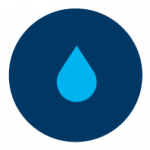Improving water governance
By improving water governance, we can achieve the 2030 Agenda on Sustainable Development, address climate change and reverse environmental degradation. SIWI works with all sectors of society to make this possible.
Many of the world’s greatest challenges are linked to water. Climate change, for example, is primarily felt in the form of too much or too little water, like floods or droughts. In the coming years, we will see a growing number of water-related climate disasters and more hunger when rainfall patterns are increasingly unpredictable. The Global South and people living in poverty will be hardest hit, resulting in growing inequality.
Viewed this way, achieving the Sustainable Development Goals may seem like a pipe dream. But we can choose another path and instead invest in improved water governance. This will reduce poverty (SDG1), strengthen food security (SDG2), improve people’s health (SDG3) and ensure that more children go to school (SDG4), especially girls who are otherwise most at risk of having to fetch water instead of studying.
SIWI advocates for this at the local, regional, national, and global levels. Decision-makers need to be aware of existing solutions and have the capacity to make important shifts. Food security in Sub-Saharan Africa could for example increase significantly with more investment in improved water management for the region’s many smallholder farmers. Poverty levels can drop if everyone has access to clean water and safe sanitation. It is possible to reduce the risk of climate disasters and water pollution by using trees and wetlands in city planning to clean water and prevent flooding. To name but a few examples.
Recognizing that these challenges will not be solved by one organization, group, or country alone, SIWI takes a multi-disciplinary approach. We work across sectors, countries, and cultures to generate and share knowledge on solutions that improve the resilience of people and societies.
A new approach to water governance is urgently needed and SIWI is leading the way. With three decades of experience, an extensive network and an unusually broad range of expertise, we are well-positioned to help different stakeholders navigate this new and challenging water governance landscape. SIWI offers advice, facilitates dialogues, provides platforms for collaboration, generates knowledge, implements programmes, and develops capacity for improved water governance all over the world.
Principles that guide SIWI’s work
- Water governance must be broad and inclusive. The sectors that have the largest impact on water resources – like agriculture and industry – must be at the decision-making table. But it is equally important to ensure that everyone has a say in water decisions that impact them.
- Effective water governance must be based on a human rights-based approach, gender equality, and youth empowerment. These three cross-cutting issues are mainstreamed into all our work.
- Water governance often means working across national boundaries. SIWI is a leading expert on transboundary water cooperation where countries jointly manage a shared water resource. We are trusted, impartial advisors who help parties create institutions based on science and transparency.
- Good water governance requires system thinking, beyond sectoral boundaries. SIWI’s areas of expertise range from agriculture to finance, city planning, forestry, and water resources management, to name a few. This holistic approach is needed to understand today’s complex water challenges and identify solutions that address more than one problem.
- Water governance is a question of who gets what water – and that also means ensuring that there is enough water for ecosystems to thrive.
Guided by these principles, SIWI supports decision-makers at different levels and runs a number of projects and programmes. Our strength is the knowledge, diversity, and flexibility of our team, meaning that we always work with stakeholders to develop context-specific solutions.
SIWI takes an active part in platforms, conferences, and meetings. With our broad approach to water and development, we are well positioned to form innovative partnerships with strategic actors, including those outside the traditional water community. Together we can investigate alternative forms of financing, develop new approaches through pilots and tests, and contribute to more holistic governance of water resources.
SIWI’s programme objectives
- Contribute to Sustainable Management of Shared Water Resources by Improving Water Governance
- Contribute to Resilient Water Services and Infrastructures by Improving Water Governance
- Contribute to Inclusion of relevant stakeholders by Improving Water Governance
- Contribute to Improved and Extended Water Governance by Innovations Based on Knowledge and Learning
Programme objectives for improved water governance
Sustainable Management
 An important programme objective for SIWI is the Sustainable Management of Shared Water Resources by Improving Water Governance. This means supporting integrated water resources management (IWRM) and creating an enabling environment so that water resources can be used sustainably and equitably.
An important programme objective for SIWI is the Sustainable Management of Shared Water Resources by Improving Water Governance. This means supporting integrated water resources management (IWRM) and creating an enabling environment so that water resources can be used sustainably and equitably.
Though some countries have made impressive progress, many are only at the beginning of their journey. And all decision-makers face new challenges at a time of increasing water volatility.
SIWI’s work is focused on strengthening capacity and addressing obstacles to effective water governance. We help countries and cities set up governance structures that are efficient, transparent, and fair so that they can handle competing interests.
Sometimes, there is a need for new legislation and institutions, especially to manage water resources that are shared between countries. SIWI also hosts more informal networks, cluster groups and dialogue platforms. We are a strong advocate for water governance in financial discussions and international processes.
Managing water under increasingly challenging and uncertain circumstances requires new skills and knowledge. SIWI is active in research as well as capacity-building. One example is the source-to-sea methodology where SIWI’s pilot studies provide new knowledge that is also shared in workshops with practitioners.
Here are some key challenges to address:
- Managing competing interests. When access to water is becoming a growing concern, the water needs for industry and energy production are often prioritized at the expense of ecosystems and subsistence users.
- Making decisions at the right level. In many parts of the world, rivers and oceans are becoming more polluted because of activities taking place far away. It is important that decisions about fertilizers in agriculture, chemicals in industry and wastewater treatment in cities also consider the consequences for groundwater, oceans and rivers.
- Decision-making under growing uncertainty. The climate crisis, the growing demand for water and the threats to biodiversity mean that the past is a poor guide to the future. Decision-makers must learn more about how they can analyze complex issues, plan for uncertainty, and respond rapidly to unexpected stressors.
- Complex and emerging trends. How can decision-makers stay on top of emerging global trends, scientific discoveries, and unexpected events? Analyzing new developments and understanding how they are linked is an increasingly important skill.
- Improving communication and understanding. More and more issues cut across traditional sectors and geographical boundaries. There is a growing need for networks and dialogue platforms.
Resilient Services

SIWI works actively to support Resilient Water and Sanitation Services and Infrastructures by Improving Water Governance. The challenges are many: two billion people do not have access to clean drinking water and fewer still have safely managed sanitation.
These glaring global gaps need to be closed. The water sector must also climate-proof its services and infrastructure to cope with unprecedented storms, floods, and droughts.
SIWI supports countries seeking to overcome obstacles to good governance. Service providers are guided on how to improve their processes and identify emerging risks. Decision-makers are encouraged to learn from others so that they can find promising solutions and more accurately assess their costs and benefits.
A chronic problem is a lack of investments in operations and maintenance, often because tariffs are not high enough to cover actual costs. Many institutions also need to strengthen their capacity to assess, plan, finance and implement resilience strategies and projects.
More decision-makers need to understand the linkages between ecosystems and water availability, for example how the water consumed in cities depend on surrounding forests and landscapes.
Many cities try to apply more nature-based solutions to urban planning but encounter bureaucratic hurdles since existing regulations were developed for another era. Fragmented institutional arrangements, unclear roles and responsibilities, and weak accountability mechanisms are other areas the need to be improved.
Many of SIWI’s projects seek to address this from different perspectives. One example is the City Water Resilience Approach with policy advice and tools to support local governments. At the national level, SIWI works with UNICEF to help countries create an enabling environment for resilient and sustainable investments in water supply and sanitation.
SIWI supports Resilient Water Services and Infrastructures by Improving Water Governance, addressing challenges like:
- Improving access to and affordability of water services. Today, the poor typically pay more than affluent households for their water and sanitation but get very limited services.
- Climate-proof existing infrastructure. Even in countries with extensive water infrastructure, it is not built to withstand the extreme weather events we must expect in the future.
- Improving services in fragile countries. People in conflict-affected regions enjoy even fewer services than others, which adds to their suffering. SIWI has also shown how people’s vulnerability is often exploited by armed non-state actors, further destabilizing the situation.
- Working with nature to increase resilience. The loss of wetlands and forest landscapes can jeopardize both water quality and quantity. But nature-based solutions offer a range of cost-effective approaches that protect against weather extremes, recharge water, and store carbon.
Inclusive Processes

For water governance to be effective, it must be inclusive. When decisions are made about water, the sectors causing the most impact must be at the table – but also the people who are most impacted.
SIWI has an important role to play in contributing to the Inclusion of relevant stakeholders by Improving Water Governance. This is for example done through capacity-building on how to create inclusive decision-making processes that promote the integrity of the water sector. Water governance must be characterized by transparent, inclusive, and accountable decision.
SIWI works to improve inclusive water governance, addressing questions like:
- Making water governance more transparent. In many countries, a few powerful groups control decision-making about water through their informal networks and privileged access to information. This can fuel inefficiency, injustice, and corruption.
- Tackling corruption. Corruption in the water sector is an enormous problem that siphons away much-needed money and makes vulnerable groups even more vulnerable. SIWI helps raise awareness of the prevailing problem of sextortion where people are forced into sex for water services. It is also estimated that corruption can drive up the cost of obtaining a connection to the drinking water and sewerage network by 30 per cent in many low-income countries.
- Building capacity. Many water stakeholders, especially those representing poor and marginalized interests in society, lack the resources needed to influence water decisions. Capacity-building can make it easier for more people to have a say in planning processes.
- More inclusive processes. SIWI encourages open and inclusive water governance. This not only enhances transparency, accountability and participation but can also help build civic capacity.
Innovations, Knowledge and Learning

Water governance is becoming increasingly complex and difficult. The climate crisis creates new levels of uncertainty and will require constant innovation and learning.
SIWI contributes to Improved and Extended Water Governance by Innovations Based on Knowledge and Learning. This is in response to new needs at a time when we must always be prepared for the unexpected.
Already today, water governance is very different compared to just a few years ago. Climate change, coupled with the effects of human activity, means that those responsible for managing water resources have a much more challenging task in an ever more unpredictable environment. Many different stakeholders must collaborate to manage water collectively in a coordinated and holistic way.
In this complex environment, SIWI has an important role to play. We work to develop water governance approaches for the future, addressing topics like:
- Helping organizations prepare for constant change. The Covid-19 pandemic has provided valuable lessons on how to shift focus and handle unexpected situations. The most important learning is that the situation for marginalized groups must always be in focus.
- Innovative ideas for the future. SIWI promotes evidence-based analysis and open dialogues between a broad range of stakeholders. It is important to understand that water governance is not a set of predefined solutions, but a process that needs continuous refinement as a function of new challenges, problems, and experiences.
- The linkage between global and local perspectives. The climate crisis, the Covid-19 pandemic and other major transformations occur simultaneously at the global and the local scale. SIWI seeks to always bring these perspectives together as organizers of the leading water event World Water Week and in our daily work.